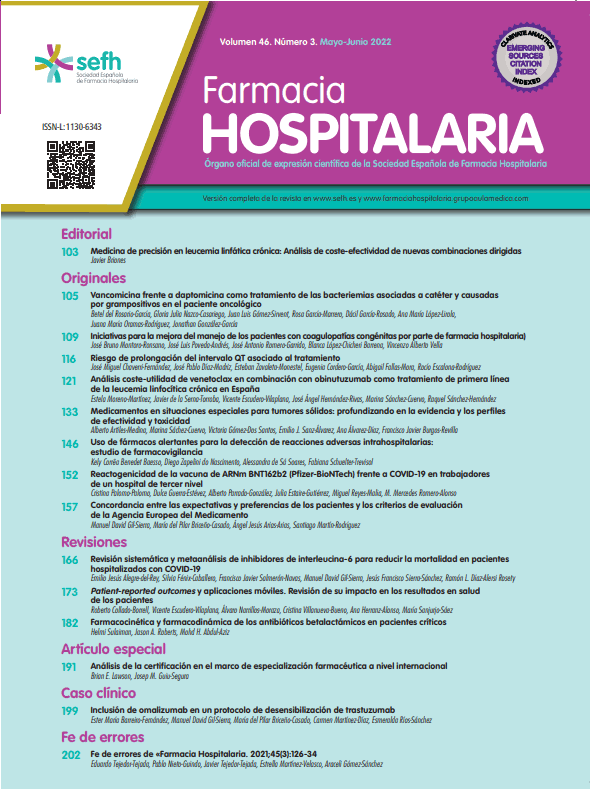In this study we will analyse the use of cetuximab in the treatment of metastatic colorectal cancer (MCC) in a third level hospital. We will establish the usage conditions in our centre in keeping with those approved in current technical records. We will also record the treatment duration under the different usage conditions and use the information available in material that has been published to date.
MethodsAn indication-prescription study of cetuximab in MCC was carried out on all patients treated with cetuximab for colorectal cancer in the period between 2004 and 2007 in our hospital. The number of prescriptions that do not fit the approved recommendations for cetuximab in MCC treatment (and why they do not fit) is determined. Descriptive statistical analysis was carried out for the different variables collected, and a Kaplan-Meier analysis was carried out for the treatment duration variable, so as to determine whether there is a difference in effectiveness for the common uses in our hospital.
ResultsData was recorded for 74 patients treated with cetuximab. The average cost per patient was €14 399 and on average, 15.3 dosages were administered per patient. The average initial dosage was 710mg with an average dosage of 446mg after that. The average duration of the treatments was 15.4 weeks. cetuximab was administered to 7 patients as first-line treatment and to 32 patients who had not used irinotecan previously. Irinotecan was not associated with cetuximab treatment in 9 patients, and it was used in 14 patients resulting in a negative outcome for the EFGR test. Treatment duration was longer in the case of its use as first-line treatment (27.7 weeks), if irinotecan had not been used before (23.3 weeks), if irinotecan was used (20.5 weeks) and in patients with positive EFGR results (19.6 weeks.) The median treatment duration, under the different conditions, was less than the average but with no major differences between them. 70.3% of prescriptions did not fit with the data sheet.
ConclusionsThe use of cetuximab under different conditions to those approved on the technical data sheet creates an increase in the number of patients treated and a longer duration of the treatments which implies an increase in intake. The average and the mean treatment times for the usage conditions found did not present any significant statistical differences. There are a small number of patients who benefit from this treatment which can be seen by the large average, in comparison with the mean, without any of the conditions in which the analysis was carried out seeming to determine a higher response. The treatment duration in our study was similar to the durations recorded in relevant literature for these usage conditions.
En este trabajo se analiza la utilización de cetuximab en el tratamiento de cáncer colorrectal metastásico (CCRm) en un hospital de tercer nivel, determinando las condiciones de uso en los pacientes de nuestro centro con relación a las aprobadas en ficha técnica en el momento. También, se compara la duración del tratamiento en las distintas condiciones de uso y con los datos disponibles en la bibliografía publicada hasta la fecha de realización de este trabajo.
MétodosSe realizó un estudio de indicación-prescripción de cetuximab en CCRm para todos los pacientes tratados con cetuximab en CCR en el período 2004-2007 en nuestro hospital. Se determina el número de prescripciones que no se ajusta a la ficha técnica aprobada para cetuximab en CCRm y el motivo por el que no se adapta. Se realiza el análisis estadístico descriptivo para las distintas variables recogidas y un análisis de Kaplan-Meier para la variable duración de tratamiento para determinar si hay diferencia de efectividad para los usos habituales en nuestro hospital.
ResultadosSe recogieron los datos de 74 pacientes tratados con cetuximab. El coste medio por paciente fue de 14.399 € y un número medio de dosis administradas de 15,3 por paciente. La dosis media de inicio fue 710mg y la de mantenimiento, de 446mg. La duración media de los tratamientos fue 15,4 semanas. Cetuximab se administró a 7 pacientes en primera línea de tratamiento, y a 32 pacientes sin que previamente se hubiese utilizado irinotecan. En 9 pacientes no se asoció irinotecan al tratamiento con cetuximab y se empleó en 14 pacientes con resultado negativo para la prueba de EFGR. La duración de los tratamientos fue mayor en caso de utilización en primera línea de tratamiento (27,7 semanas), si no se empleó irinotecan previo (23,3 semanas), si se asociaba irinotecan al tratamiento (20,5 semanas) y en pacientes EFGR positivo (19,6 semanas). Las medianas de duración de tratamiento en las diferentes condiciones recogidas eran menores en magnitud a la media, no presentando diferencias significativas entre ellas. El 70,3 % de las prescripciones no se ajustaba a la ficha técnica.
ConclusionesLa utilización de cetuximab en condiciones distintas a las aprobadas en ficha técnica origina un aumento en el número de pacientes tratados y una mayor duración de los tratamientos, lo que implica un aumento en el consumo. La media y la mediana de tiempo de tratamiento para las condiciones de utilización encontradas no presentaron diferencia estadísticamente significativa. Hay un pequeño número de pacientes que se beneficia de este tratamiento, como puede ponerse de manifiesto por la mayor magnitud de la media respecto a la mediana, sin que ninguna de las condiciones en las que se realizó el análisis parezca ser determinante de una respuesta mayor. La duración de los tratamientos en nuestro estudio fue del orden de las encontradas en la bibliografía para esas condiciones de utilización.






